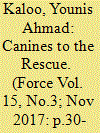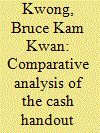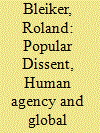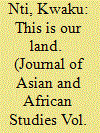|
|
|
Sort Order |
|
|
|
Items / Page
|
|
|
|
|
|
|
| Srl | Item |
| 1 |
ID:
156115


|
|
|
| 2 |
ID:
137673


|
|
|
|
|
| Summary/Abstract |
In 2013, China׳s national government abandoned its previous cautious policy and started to promote large-scale deployment of coal-based synthetic natural gas (SNG). Coal-based SNG is both carbon-intensive and very water-intensive. Driven by a smog crisis and the recession of coal industry, China׳s 2013 policy change is major setback in its long-term efforts in carbon mitigation and water conservation. The government of China made the policy change before the commercial commencement of China׳s first SNG demonstration plant. Since the commencement of China׳s SNG demonstration plant, many problems have started to appear. In this article, I discuss the nature of demonstration project and explain the danger in starting a crash program without evaluating the demonstration comprehensively and transparently.
|
|
|
|
|
|
|
|
|
|
|
|
|
|
|
|
| 3 |
ID:
124245


|
|
|
|
|
| Publication |
2013.
|
| Summary/Abstract |
In 2011, Hong Kong SAR government announced an unprecedented policy of cash handouts of 6,000 HKD to all permanent residents at the age of 18 or above as a means of defusing public discontent with economic policy and poor governance. Macau SAR has also been distributing similar cash handouts since 2008 to temper public dissatisfaction and widespread demonstrations. Initially, both SAR governments were very reluctant to initiate universal cash handouts. Unlike standard welfare programmes that are budgeted for annually, the cash payment scheme in Hong Kong SAR was a one-off handout. In Macau SAR, however, the payment scheme went from being a short-term policy to a long-term policy, while other welfare programmes were also allocated more public money. This paper argues that although such cash handout policies are avoidable, they are still being adopted by politicians who place self-interest above the public interest.
|
|
|
|
|
|
|
|
|
|
|
|
|
|
|
|
| 4 |
ID:
134900


|
|
|
|
|
| Summary/Abstract |
Described herein is an easily done exercise that demonstrates the benefits of aggregated analysis. It might be employed by instructors of intelligence analysis as an exercise in the classroom, or by the intelligence practitioners seeking some “hands on” experience with something they have heard of, but have not personally worked with.
Aggregated analysis refers to the taking of a large number of independent assessments and mathematically aggregating them to form a single assessment. This process does not include brainstorming, for example, where individuals actively interact with each other while forming the group assessment.
|
|
|
|
|
|
|
|
|
|
|
|
|
|
|
|
| 5 |
ID:
061990


|
|
|
|
|
| Edition |
2nd ed.
|
| Publication |
London, macmillan Press, 1981.
|
| Description |
xxxvi, 191p.
|
| Standard Number |
0333344928
|
|
|
|
|
|
|
|
|
|
|
|
Copies: C:1/I:0,R:0,Q:0
Circulation
| Accession# | Call# | Current Location | Status | Policy | Location |
| 021900 | 070/CLU 021900 | Main | On Shelf | General | |
|
|
|
|
| 6 |
ID:
046654


|
|
|
|
|
| Publication |
Cambridge, Cambridge University Press, 2000.
|
| Description |
289p.
|
| Standard Number |
0521778298
|
|
|
|
|
|
|
|
|
|
|
|
Copies: C:1/I:0,R:0,Q:0
Circulation
| Accession# | Call# | Current Location | Status | Policy | Location |
| 045850 | 303.61/BLE 045850 | Main | On Shelf | General | |
|
|
|
|
| 7 |
ID:
153572


|
|
|
|
|
| Summary/Abstract |
Using riot police to break up a big demonstration is a familiar occurrence
in many parts of the world, including China. But all protest
control does not involve the use of force, nor is repression always
directed at large groups of people assembled in one location. Some
repression rests on psychological rather than physical coercion and is
aimed at individuals, often in their homes or nearby. This type of
repression may be carried out by people with only a loose connection
to the state’s coercive apparatus, such as relatives, friends, or neighbors
of the target who work for the government or receive benefi ts from it.
“Relational repression” is labor intensive and a sign of a high-capacity
state that uses multiple levers to suppress contention, but has limited
reach and remains insecure about its ability to maintain social stability.
It builds on Maoist and dynastic techniques of control and aims to
extend state penetration into a marketized society whose members have increasingly emancipated themselves from direct dependence on the
government. Relational repression oft en alienates both the agents of
repression and their targets. But it can, at times, be eff ective in demobilizing
resistance or preventing a person from taking part in protest.
|
|
|
|
|
|
|
|
|
|
|
|
|
|
|
|
| 8 |
ID:
121826


|
|
|
|
|
| Publication |
2013.
|
| Summary/Abstract |
The colonial government attempted to implement the Crown Lands Bill between 1894 and 1897 in Southern Ghana. Among other things, it sought to take control of what was described as 'waste lands' and later 'public lands.' This article focuses on resistance to these bills in which the Aborigines' Rights Protect Society (ARPS) played a leading role on behalf of Southern Ghana. This was one of many precedents to the build-up of tension between the people and the colonial establishment. Among other things, the article examines the ramblings within a colonial administration that attempted to push through its policies against a background of resolute resistance. This led to reluctance on the part of some colonial officers to enforce the policy. The argument is that there was an effective collaboration between the Western-educated elite and the people of coastal Southern Gold Coast in the resistance to these bills. They used official letters of protests, newspaper articles, editorials, and demonstrations to express their dislike for the colonial land policy. In addition, they sent delegations to the colonial government in their effort to resist the attempt to take over 'waste lands' and later 'public lands.' Furthermore, this article argues that the conflict had to do with the different conceptions of land. While the colonial government saw it as part of the economic and political trappings of power, the people of Southern Ghana saw land as a cultural and religious resource that gave them the needed connection with the ancestors in their everyday life.
|
|
|
|
|
|
|
|
|
|
|
|
|
|
|
|
|
|
|
|
|